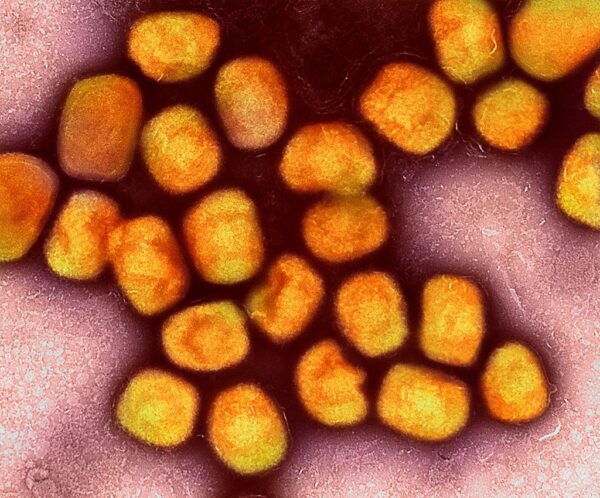Los Angeles County has an uptick in mpox cases, and health officials Monday advised vaccination and other ways to avoid the virus.
The county added 10 new reported cases of mpox in the past two weeks, an increase from an average of less than two weekly infections during the previous several weeks, according to the LA County Department of Public Health.
Mpox, previously called monkeypox, spreads primarily by close contact with body fluids, sores, shared bedding or clothing or respiratory droplets exchanged via kissing, coughing or sneezing, health officials said. Symptoms are a rash or unusual sores that resemble pimples or blisters on the face, body and genitals, in addition to fever, chills, headache, muscle aches or swelling of the lymph nodes.
“Early detection, testing and vaccination are vital to controlling the spread of this disease and protecting the health of Los Angeles County residents,” according to a county statement.
Officials recommended these spread-prevention measures:
Testing
Symptomatic people should get medical help and tested.
“Health care providers should be aware of the possibility of mpox and promptly report suspected cases to Public Health for appropriate testing and interventions,” according to the Public Health Department statement.
Prevention
The following can help reduce the risk of acquiring and spreading the virus:
- “Ask partners if they have mpox symptoms or feel sick. Individuals should not have sex or other intimate contact if they or their partners have a new or unexplained rash or sores or feel sick until they see a health care provider.
- “Reduce the number of partners, especially those whose recent sexual history is unknown.
- “Make a habit of exchanging contact information with any new partner to allow for sexual health follow-up, if needed.
- “Limit going to sex parties, circuit parties and other spaces where people are having sex or other intimate contact with multiple people.”
- Use latex or polyurethane condoms and gloves.
- “Do not share towels, clothing, bedding, fetish gear, sex toys or toothbrushes.
- “Wash hands, fetish gear, towels and bedding. Sex toys should be washed after each use or sex act.”
Vaccination
Officials said getting vaccinated is an important tool to stop the spread of mpox, and a two-dose Jynneos vaccine is available to anyone in the county.
“Individuals who identify with any of the following subgroups are highly encouraged to get vaccinated:
- “Any man or transgender person who has sex with men or transgender persons
- “Persons of any gender or sexual orientation who have sex or intimate physical contact with others in association with a large public event or engage in commercial and/or transactional sex
- “Persons living with HIV, especially persons with uncontrolled or advanced HIV disease
- “Sexual partners of people in any of the above groups”
Health officials urged people in high-risk groups to receive two vaccine doses in order to get the most effective protection.
“Second doses can be given no matter how long it’s been since the first dose,” according to the county. “Residents can choose to receive the mpox vaccine subcutaneously (in the upper arm) or intradermally (under the skin on their arm or back). Vaccine boosters are not recommended at this time.”
Public Health’s mobile vaccination units are providing free vaccination at numerous Pride events this season, Public Health’s sexual health clinics found at publichealth.lacounty.gov/chs/sexualhealthclinics/ and other walk-up vaccine clinics can be found at myturn.ca.gov/.
“Public Health and is collaborating closely with health care providers, community organizations and other stakeholders to address the mpox resurgence as swiftly and effectively as possible,” according to the Public Health statement. “Enhanced surveillance, contact tracing and outbreak investigations are underway to identify potential sources of the infection and prevent further transmission.”
Up-to-date information and resources are available at ph.lacounty.gov/mpox or by calling the Public Health Call Center at 833-540-0473.







